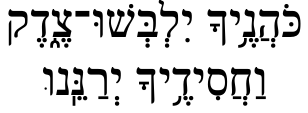Hallelujah. Ha’l’lu et shaym HAVAYAH,
Ha’l’lu avday HAVAYAH

Praise the essence of Divinity;
give praise, oh servants of the One. (Psalm 135:1)
[Click (or tap) to see the entire Psalm 135 in Hebrew and English (JPS 1985).]
I sing Hallelu-Yah to lose myself in the Mystery, to open to the unnamable. With each Hallelu-Yah, I am lifted up out of my small separate self into the larger Self that is united with the One. I sing to open the eyes of my heart that I might see the miracle that was, is and will be, always before me. I sing to give myself away.
I sing Hallelu-Yah to honor, magnify and glorify that glimpse of miracle that is given to me each morning in the dawning light of day, in the steady beat of my heart. I sing Hallelu-Yah to exalt and bless and celebrate the simple fact of existence.
Praise whittles me down to my essence, purifies me of trivialities, washes away my worries. Through praise, I remember who I am and what my life is for. Through praise I am transformed.
To hear the chants, use the audio players. To download a chant, right-click a note and save (or download) the linked MP3 file.
To download the PDF file for this chant, click Ha’l’lu PDF.




